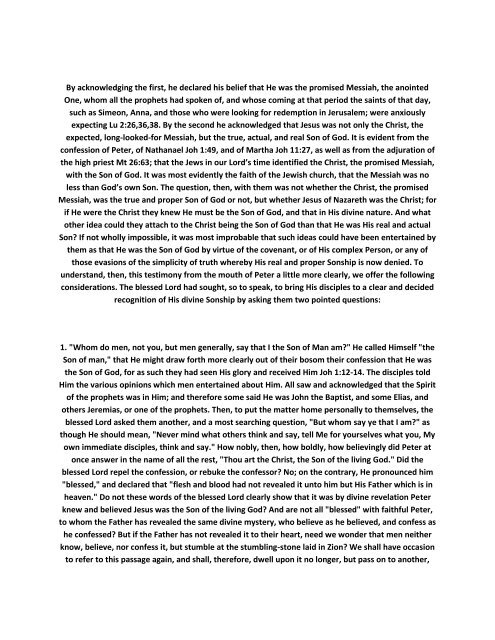the eternal sonship of the lord jesus christ - Paradise Primitive ...
the eternal sonship of the lord jesus christ - Paradise Primitive ...
the eternal sonship of the lord jesus christ - Paradise Primitive ...
Create successful ePaper yourself
Turn your PDF publications into a flip-book with our unique Google optimized e-Paper software.
By acknowledging <strong>the</strong> first, he declared his belief that He was <strong>the</strong> promised Messiah, <strong>the</strong> anointedOne, whom all <strong>the</strong> prophets had spoken <strong>of</strong>, and whose coming at that period <strong>the</strong> saints <strong>of</strong> that day,such as Simeon, Anna, and those who were looking for redemption in Jerusalem; were anxiouslyexpecting Lu 2:26,36,38. By <strong>the</strong> second he acknowledged that Jesus was not only <strong>the</strong> Christ, <strong>the</strong>expected, long-looked-for Messiah, but <strong>the</strong> true, actual, and real Son <strong>of</strong> God. It is evident from <strong>the</strong>confession <strong>of</strong> Peter, <strong>of</strong> Nathanael Joh 1:49, and <strong>of</strong> Martha Joh 11:27, as well as from <strong>the</strong> adjuration <strong>of</strong><strong>the</strong> high priest Mt 26:63; that <strong>the</strong> Jews in our Lord’s time identified <strong>the</strong> Christ, <strong>the</strong> promised Messiah,with <strong>the</strong> Son <strong>of</strong> God. It was most evidently <strong>the</strong> faith <strong>of</strong> <strong>the</strong> Jewish church, that <strong>the</strong> Messiah was noless than God’s own Son. The question, <strong>the</strong>n, with <strong>the</strong>m was not whe<strong>the</strong>r <strong>the</strong> Christ, <strong>the</strong> promisedMessiah, was <strong>the</strong> true and proper Son <strong>of</strong> God or not, but whe<strong>the</strong>r Jesus <strong>of</strong> Nazareth was <strong>the</strong> Christ; forif He were <strong>the</strong> Christ <strong>the</strong>y knew He must be <strong>the</strong> Son <strong>of</strong> God, and that in His divine nature. And whato<strong>the</strong>r idea could <strong>the</strong>y attach to <strong>the</strong> Christ being <strong>the</strong> Son <strong>of</strong> God than that He was His real and actualSon? If not wholly impossible, it was most improbable that such ideas could have been entertained by<strong>the</strong>m as that He was <strong>the</strong> Son <strong>of</strong> God by virtue <strong>of</strong> <strong>the</strong> covenant, or <strong>of</strong> His complex Person, or any <strong>of</strong>those evasions <strong>of</strong> <strong>the</strong> simplicity <strong>of</strong> truth whereby His real and proper Sonship is now denied. Tounderstand, <strong>the</strong>n, this testimony from <strong>the</strong> mouth <strong>of</strong> Peter a little more clearly, we <strong>of</strong>fer <strong>the</strong> followingconsiderations. The blessed Lord had sought, so to speak, to bring His disciples to a clear and decidedrecognition <strong>of</strong> His divine Sonship by asking <strong>the</strong>m two pointed questions:1. "Whom do men, not you, but men generally, say that I <strong>the</strong> Son <strong>of</strong> Man am?" He called Himself "<strong>the</strong>Son <strong>of</strong> man," that He might draw forth more clearly out <strong>of</strong> <strong>the</strong>ir bosom <strong>the</strong>ir confession that He was<strong>the</strong> Son <strong>of</strong> God, for as such <strong>the</strong>y had seen His glory and received Him Joh 1:12-14. The disciples toldHim <strong>the</strong> various opinions which men entertained about Him. All saw and acknowledged that <strong>the</strong> Spirit<strong>of</strong> <strong>the</strong> prophets was in Him; and <strong>the</strong>refore some said He was John <strong>the</strong> Baptist, and some Elias, ando<strong>the</strong>rs Jeremias, or one <strong>of</strong> <strong>the</strong> prophets. Then, to put <strong>the</strong> matter home personally to <strong>the</strong>mselves, <strong>the</strong>blessed Lord asked <strong>the</strong>m ano<strong>the</strong>r, and a most searching question, "But whom say ye that I am?" asthough He should mean, "Never mind what o<strong>the</strong>rs think and say, tell Me for yourselves what you, Myown immediate disciples, think and say." How nobly, <strong>the</strong>n, how boldly, how believingly did Peter atonce answer in <strong>the</strong> name <strong>of</strong> all <strong>the</strong> rest, "Thou art <strong>the</strong> Christ, <strong>the</strong> Son <strong>of</strong> <strong>the</strong> living God." Did <strong>the</strong>blessed Lord repel <strong>the</strong> confession, or rebuke <strong>the</strong> confessor? No; on <strong>the</strong> contrary, He pronounced him"blessed," and declared that "flesh and blood had not revealed it unto him but His Fa<strong>the</strong>r which is inheaven." Do not <strong>the</strong>se words <strong>of</strong> <strong>the</strong> blessed Lord clearly show that it was by divine revelation Peterknew and believed Jesus was <strong>the</strong> Son <strong>of</strong> <strong>the</strong> living God? And are not all "blessed" with faithful Peter,to whom <strong>the</strong> Fa<strong>the</strong>r has revealed <strong>the</strong> same divine mystery, who believe as he believed, and confess ashe confessed? But if <strong>the</strong> Fa<strong>the</strong>r has not revealed it to <strong>the</strong>ir heart, need we wonder that men nei<strong>the</strong>rknow, believe, nor confess it, but stumble at <strong>the</strong> stumbling-stone laid in Zion? We shall have occasionto refer to this passage again, and shall, <strong>the</strong>refore, dwell upon it no longer, but pass on to ano<strong>the</strong>r,






